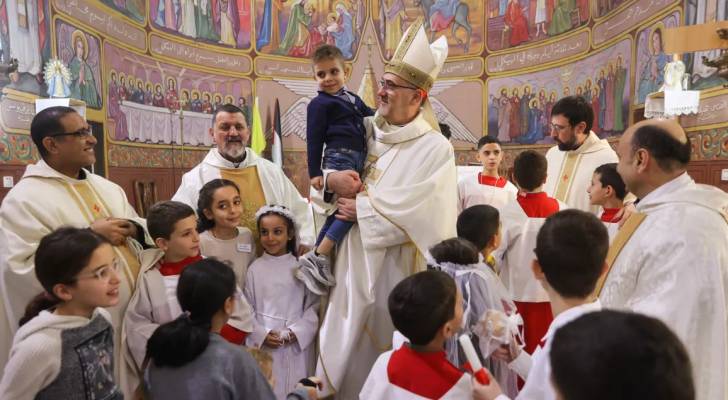Latin Patriarch of Jerusalem Pierbattista Pizzaballa at the Holy Family Church in Gaza City (Credit: AFP)
Christians vow to remain in Gaza church despite 'Israeli' threats
In the heart of Gaza City, the Holy Family Church has become a fragile sanctuary for hundreds of Palestinians, many of them Christians who have lost homes, loved ones, and any sense of safety after nearly two years of 'Israel’s' war.
Among them is Fouad Abu Youssef, 34, who now spends his days rummaging through piles of salvaged clothing for his five-year-old daughter, Layla.
“They took my home and my loved ones, but they won’t take my right to remain here on my land no matter how dark it gets,” he told Al Jazeera.
Fouad has buried his sister after an air strike, seen his home collapse, and even lived in a cemetery with his elderly parents and siblings before finding refuge inside the church compound in Gaza’s Zeitoun neighbourhood.
But the sense of safety is fragile. The church itself was shelled by an 'Israeli' tank in July, killing three and wounding others. Another attack last December killed two women inside. Despite 'Israeli' assurances that churches are not targets, many displaced families fear the worst.
More than 550 people are currently sheltering in the Holy Family Church. Nearby Christian sites, the Greek Orthodox Church of Saint Porphyrius and the Anglican St Philip’s Church, were placed in 'Israel’s' evacuation zones, deepening fears that sanctuaries offer no real protection.
Still, most have chosen to stay. Community leaders issued a joint statement warning that forced displacement would be “nothing less than a death sentence.” A church spokesperson, Farid Gibran, stressed that staying is voluntary, “This decision came with complete freedom.”
For many, the decision is driven by both faith and despair. Moussa Saad Ayyad, a father of four, said, “We came to the church because it feels like the only safe place left, a place where we can be together and find help. Its ties abroad give us some protection.” Yet he admitted, “If the danger gets worse, each of us may have no choice but to flee south on their own.”
Others see remaining as symbolic resistance. Parish priest Father Gabriel Romanelli, who was wounded in the July shelling, said the choice to stay preserves the church as “a place of worship and life.”
He added, “For these refugees, remaining represents more than defiance. It’s symbolic, [the] protection of a place embodying their community’s history.”
Inside the compound, solidarity between Christians and Muslims has grown. Families share food and water, despite severe shortages. A priest, speaking anonymously, said, “Our presence [in the church] represents centuries of historical continuity in this land. We are here to pray, to serve and to bear witness to hope in the midst of darkness.”
The church’s ties to the Vatican provide some international attention. The late Pope Francis called parishioners almost daily during the war, and top clerics including Cardinal Pierbattista Pizzaballa and Patriarch Theophilos III visited in July to deliver food and medical supplies.
But for residents like Maryam al-Omr, 69, who lost her home in Tal al-Hawa, survival comes down to faith, “I will not leave here, even if it means dying. This church is my last home, and I will not abandon it.”
Others remain torn. One displaced man admitted, “We’re grateful for the international statements. But we still face shortages of food, medicine and fuel. We need more than words.”
As night falls, Fouad settles his daughter to sleep in a corner of the parish. Her cries of hunger echo as he whispers words of comfort, caught between despair and defiance.
“I don’t want anyone to see my pain. Get me out of this country,” he said softly. Moments later, his tone shifted, “We will stay here, whatever comes.”




